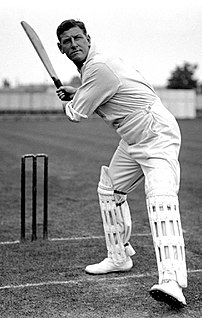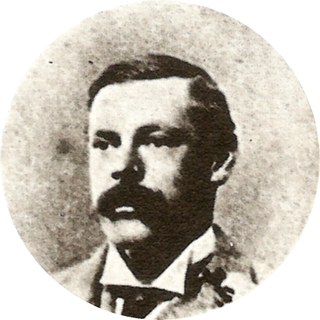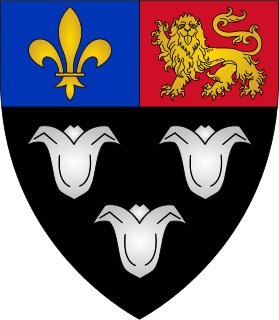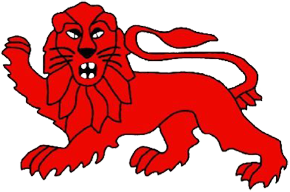
Samuel Moses James Woods was an Australian sportsman who represented both Australia and England at Test cricket, and appeared thirteen times for England at rugby union, including five times as captain. He also played at county level in England at both soccer and hockey. At cricket—his primary sport—he played over four hundred first-class matches in a twenty-four-year career. The majority of these matches were for his county side, Somerset, whom he captained from 1894 to 1906. A. A. Thomson described him thus: "Sammy ... radiated such elemental force in hard hitting, fast bowling and electrical fielding that he might have been the forerunner of Sir Learie Constantine."

Francis Alexander MacKinnon, The 35th MacKinnon of MacKinnon DL was the longest-lived Test cricketer until being surpassed by Eric Tindill of New Zealand on 8 November 2009. MacKinnon, who was 98 years, 324 days old when he died, was the oldest-ever first-class cricketer at that time.
Lieutenant-Colonel Christopher Heseltine, OBE was a cricketer. Despite not making the XI at Eton or winning a Blue at Cambridge University, he went on to play cricket Hampshire County Cricket Club between 1895, when it became a first-class side, and 1904 and for the Marylebone Cricket Club between 1892 and 1914.

Herbert Tremenheere "Herbie" Hewett was an English amateur first-class cricketer who played for Somerset, captaining the county from 1889 to 1893, as well as Oxford University and the Marylebone Cricket Club. A battling left-handed opening batsman, Hewett could post a large score in a short time against even the best bowlers. Capable of hitting the ball powerfully, he combined an excellent eye with an unorthodox style to be regarded at his peak as one of England's finest batsmen.

William Nichols "Bill" Roe was an English first-class cricketer who played for Somerset County Cricket Club and Cambridge University in the late 19th century. A right-handed batsman who could play aggressively, but with a sound defensive method, Roe was considered one of Somerset's leading batsmen of the era. He played without merit for Cambridge, and only achieved his Blue during his final year at the university.

John Wemyss "Jake" Seamer was an amateur cricketer who played for Oxford University and Somerset either side of the Second World War. A bespectacled cricketer, Seamer was a right-handed batsman who played with a defensive streak to his game which was rarely seen among amateur batsmen of his time. He was described as a leg break googly bowler, but in truth he rarely bowled at all, and claimed just four first-class wickets.
John Daniell, was an international rugby union player for England and a first-class cricketer for Somerset and Cambridge University Cricket Club.

Richard Cameron North Palairet was an English cricketer who played first-class cricket for Oxford University and Somerset. After his playing days, he became a prominent cricket administrator, acting as secretary at Surrey County Cricket Club and being joint manager, with Pelham Warner, of the English cricket team in Australia in 1932-33 which became embroiled in the Bodyline controversy.
Andrew Marshall Porter was an Irish barrister who was killed in the Second Boer War while fighting for the Imperial Yeomanry. He was also a noted sportsman, representing Ireland at both cricket and field hockey.
Alfred Ernest Yates Trestrail was an English lawyer and cricketer.
Malcolm Douglas Lyon, generally known as Dar Lyon was an English first-class cricketer who played for Somerset County Cricket Club through the 1920s. He was a right-handed top order batsman known for his beautiful driving who occasionally captained and kept wicket for the county.

Joseph Arthur Gibbs was an English cricketer who made ten first-class appearances between 1891 and 1896. He played five first-class matches for Somerset, and also appeared for the Marylebone Cricket Club (MCC) and I Zingari. He also published a number of books, including A Cotswold Village; or, country life and pursuits in Gloucestershire and The Improvement of Cricket Grounds on economical principles.
Cecil Edmund Currie was an English cricketer, who played for Cambridge University and Hampshire. Outside cricket, he was a solicitor at Freshfields & Leece in London.
Squadron Leader Alexander Campbell Shirreff, known as Alan Shirreff, was an English pilot who served in the Royal Air Force during the after the Second World War. Shirreff was also an amateur cricketer who played first-class cricket either side of the Second World War. He played as an all-rounder, taking over 300 wickets with his medium pace deliveries.
Dudley David Pontifex was an English cricketer who played first-class cricket for Surrey, Somerset and the Marylebone Cricket Club, plus other amateur sides, between 1878 and 1896. He was born at Weston, Bath, Somerset, and died at West Dulwich, London.
John Arundell Winter was an English cricketer who played first-class cricket for Somerset County Cricket Club in 1884. He was born at Ash Priors, Taunton, Somerset and he died at Hampton Wick, Middlesex.
Henry Edward Murray-Anderdon was a cricket administrator who served as the secretary and guiding spirit in the early days of Somerset County Cricket Club and later as the club president.
Christopher Burfield Howland was an English amateur cricketer who mainly played for Cambridge University Cricket Club. He was a wicket-keeper who played for a number of amateur teams and worked in the City of London.
Edwin Francis Dyke was an English clergyman and cricketer who played first-class cricket for Cambridge University in 1864 and 1865 and for Marylebone Cricket Club in 1866. He was born in London and died at Maidstone, Kent.
Edward Wynell Mayow Lloyd was an English schoolmaster and a cricketer who played first-class cricket for Cambridge University and the Marylebone Cricket Club (MCC) between 1866 and 1868. He was born at Benares, India and died at Hartford Bridge, Hartley Wintney, Hampshire.














